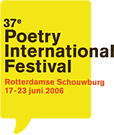Poet
|
Girgis Shoukry 1967-... country: Egypt language: Arabic |
Girgis Shoukry was born in 1967 into a Coptic family in Sohag, Egypt, some 500 km south of Cairo. He studied to go into business, but found his career in art criticism. Hij now works as a drama critic for the Radio and Television magazine in Cairo and a co-editor of the Aswaat adabiyya (Literary Voices) series. In 1996 he published his first collection of poems, Fallen under my Soles. Subsequent collections were A Good Person in Conversation with Himself, Cairo, 1998 and The Importance of a Dog in a Play, Cairo, 2000. An important theme in Girgis Shoukry’s work is the church. His poems depict the clash between the child and the grown-up world with its rituals and biblical stories. A child gets in the way of a priest performing his rituals, and the story of the resurrection of Lazarus no longer holds water when relatives die. Another theme is death, which is everywhere in Shoukry’s first collection. ‘Folksong’ is a poem of death and the dead. In other poems, those who are the subject of the poem, die. Church and death combine in the poem in which the priest Daniel is killed because he prefers Fatima to Mary. Things constitute a third theme in Shoukry’s poetry. Things are given a voice, things have feelings. Death and things meet in the poem ‘Death’. The final lines are: When I decided to go on a journey the house wept It became a handsome casket, which ordered me to rest in peace in it. The poems of Girgis Shoukry are straightforward in content, telling simple events from a shifted perspective. He himself likenes his poetry to the paintings of the Belgian artist Magritte, from whose work he borrowed the cover designs for his collections. Author: Kees Nijland Translated by Ko Kooman Girgis Shoukry (Egypt, 1967) grew up in Sohag (southern Egypt) and now lives in Cairo. He has worked as a theatre critic and has published three collections of poems which show strong influences of his Coptic upbringing. He says of his work: ‘I want to write poetry that resembles the people in the streets. I want to see how the ‘grand’ philosophical questions of Death, Love, etc., affect the daily lives of the people I write about.’ Poets: |


